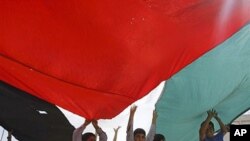Palestinians across the West Bank have been demonstrating this week to show support for statehood. The display comes ahead of a speech Friday by Palestinian leader Mahmoud Abbas in which he is expected to demand membership in the United Nations.
With Palestinian leader Mahmoud Abbas in New York, thousands of Palestinians gathered Wednesday in Ramallah and other West Bank cities to show support for Palestinian membership in the United Nations.
Ramallah Governor Laila Ghanam told the crowd it was a historic moment for which the Palestinian people have been waiting for a long and bloody time. The demonstrations were largely peaceful.
|
Palestinian Statehood Bid Breakdown
The Process - Palestinians say they are seeking U.N. recognition after years of negotiations with Israel failed to deliver an independent state.
- It is not clear if Palestinian President Mahmoud Abbas will seek U.N. Security Council approval of U.N. member status for an independent Palestine, or instead seek "non-member status" within the world body.
- The mechanism for recognizing statehood at the United Nations is specific.
- First, a resolution declaring a State of Palestine as a full U.N. member is introduced. Then the resolution is sent to the Security Council, which studies it and takes a vote on sending the measure to the full General Assembly. It takes two thirds of the U.N.'s membership to approve voting-state status.
- Achieving non-member status requires only a simple majority vote in the 193-member General Assembly. Palestinians currently hold observer status at the world body.
- Non-voting U.N. membership would provide Palestinians with a status upgrade that would allow them to petition U.N. committees and entities such as the International Court of Justice.
Why the Palestinian bid?
- President Abbas backed out of U.S.-led peace talks last year in protest against Israel's decision to end a freeze in settlement building on land the Palestinians want for a future state. Palestinians say because the peace process has failed, they will unilaterally seek to establish a state. Abbas said the Palestinians are the only people in the world who remain under occupation.
Why the Israelis oppose the move?
- Israeli Prime Minister Benjamin Netanyahu says the Palestinians' plan to seek statehood recognition at the United Nations is "futile," and that only direct negotiations can lead to a peace agreement.
- Netanyahu has accused the Palestinians of "consistently evading" negotiations. He called on the Palestinian Authority "to abandon unilateral steps" and said it would then "find Israel to be a genuine partner" for peace.
- Israel leaders say that by bypassing talks and going to the U.N., the Palestinians are violating previous agreements, and that could result in Israeli sanctions.
Why the U.S. promises to veto?
- The Obama administration opposes the Palestinian move and says it will not help to bring Palestinians and Israelis back to the negotiating table. President Obama has called the proposal a "distraction" to attaining Mideast peace that he says can only be addressed through negotiations.
- The U.S., one of five veto-wielding members of the U.N. Security Council, says it will veto a Palestinian membership bid in the Council if it comes to a vote.
|
But Israeli security forces used tear gas to counter several dozen rock-throwing youths at checkpoints near Hebron and Qalandia, north of Jerusalem.
Israeli leaders say the Palestinian drive for U.N. recognition will hurt peace talks between the two sides. Palestinian leaders hope U.N. recognition, however, will revive the talks and boost their drive for independence.
Some Palestinians, such as butcher Tamer Marmesh in Ramallah, dismiss the drive for U.N. recognition. He said going to the United Nations is nonsense.
"Even if we get recognition, we are under occupation. It is a meaningless venture," he said.
In Jerusalem, Israeli office worker Ziva Gazit agreed, although she said she supports a separate state for the Palestinians.
"I think that a U.N. declaration will result in nothing for the average Palestinian in the cities. Nothing will happen for the moment and they will be very disappointed, I am afraid," she said.
Support among Palestinians for U.N. recognition is generally split along party lines. Fatah, which governs much of the West Bank, backs Abbas.
But Hamas, which controls the Gaza Strip, opposes the bid for U.N. recognition. Spokesman Sami Abu Zuhri said it will only further legitimize Israel, which Hamas refuses to recognize.
He said that Abbas's move is an individual step that does not enjoy the support of the majority of the Palestinian people. He said it is a cosmetic move that will bring no real benefit.
On Thursday, hundreds of Palestinians in Ramallah protested the U.N. speech by U.S. President Barack Obama, in which he said a Palestinian state could be established only through direct negotiations.
Israeli news media praised the speech, saying the American president for the first time had shown an understanding of Israel's particular concerns.
Follow our Middle East reports on Twitter
and discuss them on our Facebook page. |




